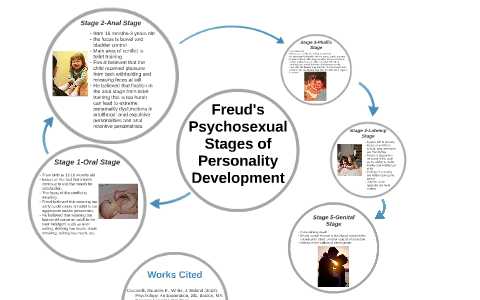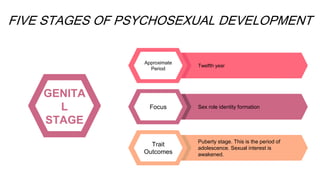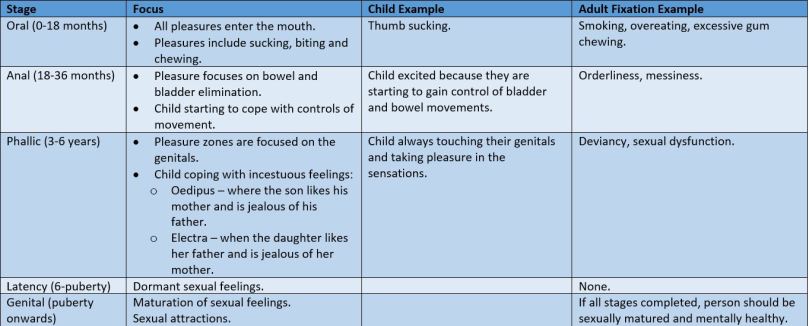Psychosexual development is a theory proposed by Sigmund Freud that suggests that an individual's personality and behavior are shaped by their experiences and conflicts during different stages of their childhood. Freud believed that an individual's sexual energy, or libido, is a driving force behind their behavior and that this energy is focused on different body parts at different stages of development. According to Freud's theory, there are five stages of psychosexual development: oral, anal, phallic, latent, and genital.
The oral stage occurs during the first year of life and is characterized by the infant's focus on their mouth as a source of pleasure. This stage is important because it sets the foundation for the infant's ability to trust and bond with others. If the infant's needs are met consistently and they form a strong attachment with their primary caregiver, they will develop a sense of trust and security. However, if the infant's needs are not met consistently or they experience neglect or abuse, they may develop a sense of mistrust and insecurity.
The anal stage occurs during the second year of life and is characterized by the child's focus on their anus and bowel movements. This stage is important because it helps the child learn to control their bodily functions and to follow rules. If the child is able to successfully master these skills, they will develop a sense of pride and accomplishment. However, if the child experiences punishment or criticism for their bowel movements, they may develop feelings of shame or a sense of rebellion.
The phallic stage occurs during the third to fifth years of life and is characterized by the child's focus on their genitals and their desire to explore their own and others' bodies. This stage is important because it helps the child develop their sense of identity and their relationships with others. If the child is able to successfully navigate this stage, they will develop a healthy sense of self and positive relationships with others. However, if the child experiences inappropriate or overly strict boundaries or sexual abuse, they may develop unhealthy or distorted views of sexuality.
The latent stage occurs during the sixth to twelfth years of life and is characterized by a decrease in the child's focus on their sexual and aggressive impulses. This stage is important because it allows the child to develop their interests, hobbies, and friendships outside of their family. If the child is able to successfully navigate this stage, they will develop a strong sense of independence and the ability to form close, healthy relationships with others. However, if the child experiences conflicts or problems during this stage, they may have difficulty developing their sense of identity or forming healthy relationships.
The genital stage occurs during puberty and is characterized by the reawakening of the child's sexual and aggressive impulses. This stage is important because it marks the beginning of the individual's ability to reproduce and to form intimate relationships with others. If the individual is able to successfully navigate this stage, they will develop a healthy and positive view of their sexuality and the ability to form close, intimate relationships with others. However, if the individual experiences conflicts or problems during this stage, they may have difficulty developing a healthy and positive view of their sexuality or forming intimate relationships with others.
Overall, Freud's theory of psychosexual development suggests that an individual's personality and behavior are shaped by their experiences and conflicts during different stages of childhood. While this theory has been influential, it has also been controversial and has been revised and modified by other theorists. However, it remains an important and influential theory in the field of psychology.
Psychosexual development is a theory proposed by Sigmund Freud, which outlines the development of an individual's sexuality and sexual behavior from infancy to adulthood. According to Freud, an individual's psyche, or personality, is shaped by their experiences and conflicts that occur during five stages of psychosexual development. These stages are the oral stage, the anal stage, the phallic stage, the latent stage, and the genital stage.
The oral stage is the first stage of psychosexual development and occurs from birth to approximately 18 months of age. During this stage, the primary source of pleasure is the mouth and the infant's primary means of exploring their environment is through oral activities such as sucking, biting, and chewing. Freud believed that the resolution of conflicts during this stage can have a lasting impact on an individual's personality. For example, if an infant's needs for oral pleasure are consistently met, they may develop a sense of trust and a positive outlook on life. On the other hand, if the infant's oral needs are consistently frustrated, they may develop feelings of mistrust and a negative outlook.
The anal stage is the second stage of psychosexual development and occurs from approximately 18 months to three years of age. During this stage, the child's primary focus is on control of their bowel and bladder functions. Freud believed that the child's experiences during this stage can have a significant impact on their personality, particularly in regards to their sense of orderliness and their attitude towards authority. For example, if a child is successful in gaining control of their bowel and bladder functions, they may develop a sense of pride and self-control. On the other hand, if the child experiences conflicts or frustrations in this area, they may develop feelings of shame or a rebellious attitude towards authority.
The phallic stage is the third stage of psychosexual development and occurs from approximately three to six years of age. During this stage, the child's primary focus is on their genitalia and their emerging sexual feelings. This is also the stage in which the child becomes aware of the differences between males and females. Freud believed that the child's experiences during this stage can have a significant impact on their sexual development and their relationships with others. For example, if a child's sexual feelings are met with acceptance and understanding, they may develop a healthy sense of sexual identity. On the other hand, if the child's sexual feelings are met with fear or repression, they may develop feelings of guilt or shame about their sexuality.
The latent stage is the fourth stage of psychosexual development and occurs from approximately six years of age to puberty. During this stage, the child's sexual feelings and interests are largely dormant and they focus on developing their social skills and interests. This is also the stage in which the child begins to develop close friendships with same-sex peers. Freud believed that the child's experiences during this stage can have a significant impact on their social development and their relationships with others.
The genital stage is the final stage of psychosexual development and occurs during puberty and adulthood. During this stage, the individual's sexual feelings and interests become more focused on their opposite-sex peers and they begin to form sexual relationships. Freud believed that the resolution of conflicts during this stage is crucial for the development of a healthy adult sexuality.
In conclusion, the five stages of psychosexual development outline the development of an individual's sexuality and sexual behavior from infancy to adulthood. According to Freud, an individual's psyche is shaped by their experiences and conflicts during these stages, and the resolution of these conflicts is crucial for the development of a healthy adult sexuality. While Freud's theory of psychosexual development has been widely influential, it has also been met with criticism and controversy, and many of his ideas have been revised or rejected by modern psychologists.







